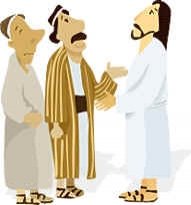Greatness Defined
 Charles Spurgeon once preached on the foolishness of pride, calling it “a groundless thing” and “a brainless thing” as well as “the maddest thing that can exist.” None of us like to admit that we suffer from pride, but it's stubborn presence is in all of us. Even the disciples of Jesus were afflicted by it; in fact, they were prime offenders.
Charles Spurgeon once preached on the foolishness of pride, calling it “a groundless thing” and “a brainless thing” as well as “the maddest thing that can exist.” None of us like to admit that we suffer from pride, but it's stubborn presence is in all of us. Even the disciples of Jesus were afflicted by it; in fact, they were prime offenders.Pride was especially seen in the disciples’ quest for recognition in Mark 9:33-37. This pursuit wasn’t subtle, and it wasn't every-so-often. By their own accounts, it was outrageous and often. Mark 9:33, 34 says when the disciples and Jesus were traveling together. “They came to Capernaum. When he was in the house, he asked them, ‘What were you arguing about on the road?’” But the disciples “kept silent”—no doubt from embarrassment and shame, “for on the way they had argued with one another about who was the greatest." Men who were receiving intensive training from Jesus, the ultimate example of humility and servanthood, were in a full-scale argument about their relative superiority to each other. Sounds like Congress today...:)
 Jesus knew their hearts, just as He knows ours. So He immediately addressed their selfish attitudes: “And he sat down and called the twelve. And he said to them, ‘If anyone would be first, he must be last of all and servant of all’” (Mark 9:35). Jesus was redefining greatness in a way that had never been seen. But His point apparently didn’t sink in too far.
Jesus knew their hearts, just as He knows ours. So He immediately addressed their selfish attitudes: “And he sat down and called the twelve. And he said to them, ‘If anyone would be first, he must be last of all and servant of all’” (Mark 9:35). Jesus was redefining greatness in a way that had never been seen. But His point apparently didn’t sink in too far.In Mark 10 we find the brothers James and John approaching the Savior apart from their fellow disciples. In apparent agreement with each other about their greatness, the two brothers bring Jesus a special request. John and James think that Jesus shares their self-absorbed opinion of themselves, because there’s no lack of confidence in what they ask. “Teacher,” they say to Him, “we want you to do for us whatever we ask of you.” Jesus asks them what they desire. They answer, “Grant us to sit, one at your right hand and one at your left, in your glory” (Mark 10:35–37).

Mark has already informed us that Jesus and His disciples are going up to Jerusalem, where James and John and the others expect the Savior to immediately establish His kingdom, with armies and policies. He will enter His “glory” and the two brothers want a place in it. They assumed that a place of power for them is appropriate because of their superiority. “Let’s settle this greatness issue now,” they say. “Who’s the greatest? We're the greatest! And Master, we want You to acknowledge this fact by letting us sit on Your right and on Your left.”
The pride of their hearts are out in the open. There’s nothing subtle about their request. They’re not asking for faith to endure His suffering. They’re not asking to support Him during His suffering. They want to be famous, pure and simple. James and John have defined greatness as position and power, and they want the title. They want the respect, the acclaim, and the importance. In their prideful hearts, Jesus is just a means to their end of personal aspirations.
This passage doesn't exclude the other disciples, because the other ten are no different. They somehow learn of James and John’s request and become “indignant at James and John” (Mark 10:41), revealing the desire in their own hearts for power.
Can you see yourself in this story? It’s easy for us at times to get mad at the disciples and not recognize our face in their story. They argued on the road about who was the greatest; we may not openly argue about this, but don’t we have the same debate every day in our private thoughts? If you’re like me, you compare yourself to others and look for opportunities to claim greater importance than them, just as the disciples did.
Aren't you glad that Jesus is merciful and gentle with our pride. We read in Mark 10:42, “And Jesus called them to him.” Can you see Jesus' patience with them, as well as His commitment to teach them what they really needed to learn? He reminds them first of what they’ve all observed during the long years of Roman occupation: “You know that those who are considered rulers of the Gentiles lord it over them, and their great ones exercise authority over them.” Then the Savior sets down a contrast: “But it shall not be so among you.”
We always want to pay careful attention when that word must appears in Scripture. “Must” points us to something that’s required. “You want to be great?” Jesus is saying. “Well, here’s what has to happen. What’s required is that you become a servant to others; it means nothing less than becoming the slave of everyone.” Remember that the Person standing there and making this statement is the ultimate example of true greatness Himself. And this is exactly what Jesus goes on to make clear: “For even the Son of Man came not to be served but to serve, and to give his life as a ransom for many” (v. 45).
As sinfully and culturally defined, trying to achieve greatness looks like this: Individuals motivated by self-interest, self-indulgence, and a false sense of self-sufficiency pursue selfish ambition for the purpose of self-glorification. The opposite of true greatness as biblically defined: Serving others for the glory of God. This is the genuine expression of humility; this is true greatness as the Savior defined it.
True greatness is all around us. The question is, do we see it? Or more importantly, are we pursuing it?
Go out there today and seriously pursue greatness by serving someone. Go to someone's aid. Help the helpless. Make Jesus proud of you. Be great by imitating the greatest of them all....Jesus
On my way to being greater by serving Jesus,
Pastor Mike


0 Comments:
Post a Comment
Subscribe to Post Comments [Atom]
<< Home